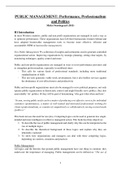PUBLIC MANAGEMENT: Performance, Professionalism
and Politics
Mirko Noordegraaf (2015)
H1 Introduction
In most Western countries, public and non-profit organizations are managed in such a way as
to optimize performance. These organizations have left their bureaucratic features behind and
have adopted businesslike management tools to become more effective, efficient and
accountable (NPM or businesslike management).
New Public Management → a collection of insights and instruments used to generate controlled
organizational action. Improving organizations by strategic planning, setting clear targets, by
monitoring techniques, quality control and more.
Public and non-profit organizations are managed in ways to resist performance pressures and
to strengthen professionalism, especially in neoliberal times
- This calls for various kinds of professional standards, including more traditional
standardization of skills
- This not only generates viable work environments, but it also buffers services against
the dominance of cost-effectiveness and productivity
Public and non-profit organizations must also be managed to serve political purposes, not only
operate public organizations in democratic context and might literally serve politics, they also
unavoidably ‘do’ politics → they will be part of determining ‘who gets what when and how’.
“In sum, serving public needs can be a matter of producing cost-effective services for individual
customers (performance), a matter of well-trained and motivated professionals working for
clients (professionalism), or a matter of competitively or collaboratively serving societal needs
(politics).”
This book stresses the need for interplay. Competing logics can be used to generate less single-
minded and more intelligent or reflexive managerial action. This book has three objectives:
1. To describe the rise of public management and clarify why this can be interpreted as the
rise of multiple logics
2. To describe the theoretical background of these logics and explain why they are
inherently contested
3. To show how organizations and managers can deal with these competing logics,
depending on contexts, situations and practices
Public Management
All logics and the theories that ground public management have one thing in common: they
underscore the importance of managing. Public management can be defined as: “The use of
1
,organizational resources in and by public and non-profit organizations to coordinate social
efforts, so that objectives can be accomplished and public needs are met.”
Despite the general relevance of public management, the discipline itself is highly fragmented.
The field of public management consists of multiple segments, subfields in which groups of
experts and scholars focus on specific themes and form distinctive communities.
→ Pressures on these fields and practices, moreover, are varied and variable
→ Societal challenges change, public expectations are dynamic and political agendas
changes over time
→ Public management is ambiguous (dubbelzinnig) and lacks a clear essence
In this book, the authors distinguish three major logics: performance, professional and political
logic. In terms of our basic definition of public management, these logics differ in terms of:
- Which resources are predominantly used
- Which objectives and public needs are taken into account
- What social action is coordinated and how coordination takes places
- Which values are served by relying on resources/coordination
The importance of situational awareness: contexts and situations are important for
understanding the nature of public management, that is, which resources are used, what needs
are met, how social actions is coordinated and which values are served.
2
,H2 The Rise of Public Management
Public and non-profit organizations seek organizational development and opt for change
programmes, they strive for cultural change and establish leadership development programmes.
Public management is not only practical and tangible, but also reflects the day-to-day reality of
managers in public organizations using management terms and instruments to accomplish goals
→ PM is both a practical phenomenon and an academic way of perceiving practices
→ It refers to real-life aspects of designing and running public organizations, including
people who act as managers
→ It also refers to analytical perspectives on actual and potential practical aspects of
designing and running public organizations
In the late nineteenth and twentieth centuries, the meaning of management was broadened.
Management came to represent a generic feature of working in formal organizations, as is
illustrated by classic definitions.
- Management theories might focus on how organizations are run and how they establish
internal discipline or other internal values
- Theories may also focus on how organizations get things done externally, how they
establish results in simple or complex environments
- Public management theories will have to do both
Definitions may vary in terms of their image on how order is maintained and how goals are set,
scholars may for example focus on mechanisms and techniques. They may show which
structures are suitable for solving problems or they show how the actors involved struggle when
problems are solved.
When goals are ambiguous and needs are contested, and when (organizational) surroundings
are complicated, we need to understand how the actors involved act and which real-life
practices and processes occur.
We need to keep a few things in mind when (public) management is defined and when available
definitions are used;
1. Management insights either focus on internal management of organizations or external
management by organizations
2. They either represent narrow and static outlooks stressing efficiency and discipline or
they embody broader and more dynamic outlooks focusing on objectives, leadership,
and values
3. They either focus on ways of managing resources or on the resources for managing
such as the processes and practices through which public management is performed
In different kinds of organizations there is obvious organizational variety in the sense that the
statutory positions of organizations, their financing systems and accountability regimes differ.
Further, in organizational terms, public refers to organizations that belong to public sectors or
public domains that are characterized.
3
, Those different kinds of characterizations are;
- A clear public position, in terms of belonging to the state and being governmental
- Clear public financing, in terms of direct or indirect taxation
- Clear relations, including accountability relations, with public policy, politics, and
political executives
Private organizations operate on markets and are not directly connected with the worlds of
politics and administration. They differ from public organizations in that they are privately
owned or have shareholders, they don’t depend on public resources, and they are not directly
subjected to political control and accountability.
It is important and relevant to understand private companies in at least two ways.
1. As the object of public management, how do public organizations try to influence
private organizations to accomplish objectives and satisfy needs?
2. As initiators of public management, how do they apply corporate social responsibility
in order to serve societal needs?
In addition to public organizations belonging to the state and private organizations belonging
to the market, there are non-profit organizations that are neither public nor private. They belong
to civil society or the third sector.
At the end of the nineteenth century, Western countries experienced massive industrialization,
accompanied by the rationalization of organizational action. Changes in civil service were
introduced, aimed at making them less political and more neutral or professional.
→ The professionalization of the civil service was a matter of both improved civil
service and declining political influences
4





